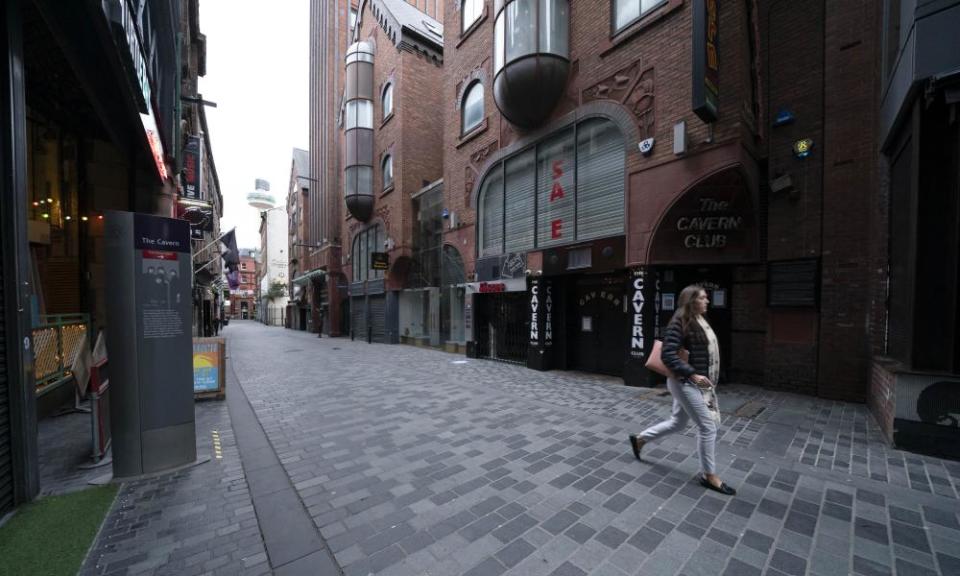Liverpool is tired, angry and ready for a fight with Boris Johnson

Last weekend, a young woman sat in a quiet Liverpool city centre street, armed with a guitar, and let rip. “Here’s to the man who thinks he knows it all, but in reality Boris has fucked us all,” she sang. Belted out may be a better description.
Related: Frustration is rising as clampdowns spread across UK: are we in grip of Covid fatigue?
It is not uncommon to come across someone in Liverpool who has no time for the prime minister or the party he leads – this city has history with both. But on Saturday night, those words were sung with a little more enmity and those that gathered to cheer on busker Emma Wharton did so with a little more fervour.
This city is tired, it is bruised – but it is angry. Angry that its hospitals are once again reaching a critical point, with exhausted healthcare workers battling against rising tragedies each day. Angry that the lifeblood of this place: the bars, the restaurants and the live music venues have all been closed, with the thousands who work in them and help build the fabric of this city told to try to top up their 67% wages with a flawed and punitive welfare system. Angry that Liverpool’s remarkable renaissance, from the industrial decline and social crises of the 1980s to the vibrant, world-renowned cultural beacon it has become, is being jeopardised by a government that does not have its best interests at heart.
What makes Liverpool’s rejuvenation over the past two decades even more impressive is that it has been achieved against a backdrop of some of the worst cuts to public services anywhere in the country. Austerity has bitten hard, with more than £430m (not to mention 3,000 staff) cut from the city council’s resources and with it the ability to provide the services that make a real difference to people’s lives.
Food bank staff and kind-hearted volunteers have desperately tried to fill the gaping holes that have been left, as the current benefits system drives people further into poverty.
When government ministers defended their position on free school meals, they neglected to mention that their specific policy of limiting any tax credits or universal credit support to only the first two children in a family is already affecting almost 1 million children. This is being done at a time when poverty is rising for larger families.
In some parts of Liverpool the number of children growing up below the poverty line is a jaw-dropping 70%. Add in a five-week wait for universal credit, pernicious sanctions and a furlough system leaving some workers earning less than the minimum wage, and you will start to see why so many people here have had enough.
The pandemic has also shone a painfully bright light on the long-term health impacts of austerity for cities such as Liverpool. The city has one of the highest mortality rates for lung cancer in England – in 2018, it was estimated that over 6,000 people were living with undiagnosed COPD (chronic obstructive pulmonary disease). Coronavirus preys on these weaknesses: by attacking the lungs, it reduces blood oxygenation and raises the heart rate, potentially overwhelming weaker cardiovascular systems. This is one big reason why Liverpool’s main hospital trust has recorded 130 Covid-19 deaths so far in October alone – with that number rising with every devastating day.
Some of the city’s health issues are historic and originate from the industries of ship building and manufacturing. You might think that a city with these long-term health problems would be met with investment in public health budgets or improvements in services aimed at enhancing life choices and chances. You, of course, would be wrong.
It was in the early days of the epidemic in this country, in late February, that Michael Marmot published his review into health equity in England – 10 years after he first warned that growing inequalities in the country would lead to worse health outcomes for people. He revealed a worrying picture in England, where life expectancy has stalled for the first time in over a century and has actually declined for the most deprived women.
His findings were unequivocal: “Austerity has taken a significant toll on equity and health, and it is likely to continue to do so. If you ask me if that is the reason for the worsening health picture, I’d say it is highly likely that is responsible for the life expectancy flat-lining, people’s health deteriorating and the widening of health inequalities.”
Scousers were too savvy and battle-hardened to ever be taken in by Boris Johnson’s talk of “levelling up”. They know from bitter experience that the Tory MPs lining up to suggest that the welfare system or local government are the best avenues for dealing with child hunger are the same people who have helped to dismantle these very lifelines over the past decade.
So where does Liverpool go from here? It’s fair to say the actions and words of Andy Burnham and Marcus Rashford up the M62 have gained plenty of traction here – talk of rebellion and revolt is in the air. With Burnham backed by his close friend and ally, Liverpool city region mayor Steve Rotheram, and the Liverpool city mayor Joe Anderson never afraid of a fight with the Tories, there are the makings of a powerful political force.
They all believe that something has to change. As Covid-19 brutally exposes the fractures in our society and the inequality that pervades this country, this view is getting more traction in our public discourse. And if they are all up for the fight, then the people of this proud, resilient city will certainly be behind them.
• Liam Thorp is political editor of the Liverpool Echo

 Yahoo News
Yahoo News 